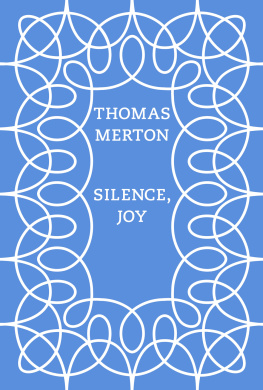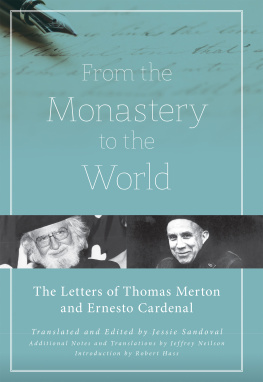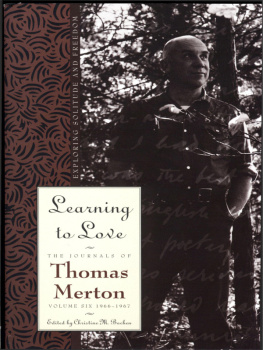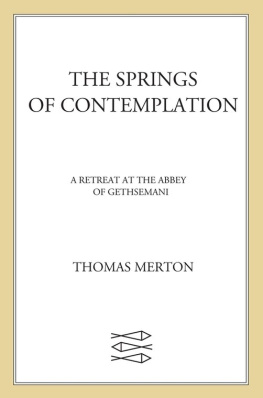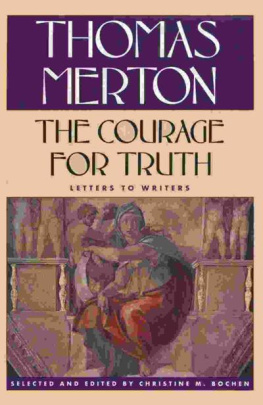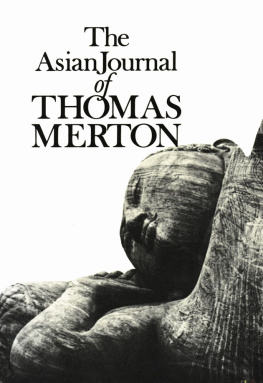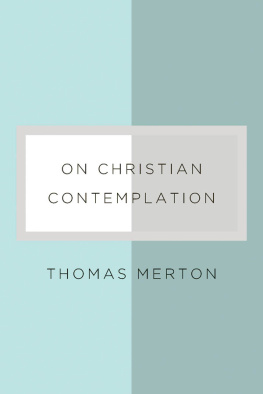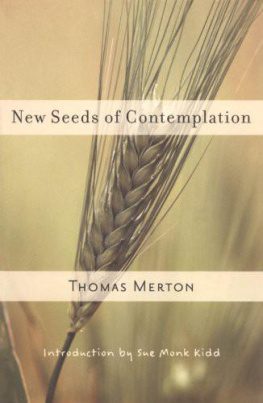SILENCE, JOY
Also by Thomas Merton
from New Directions
On Christian Contemplation
On Eastern Meditation
The Way of Chuang Tzu
Gandhi on Non-Violence
New Seeds of Contemplation
In the Dark Before Dawn
Bread in the Wilderness
Thoughts on the East
Thomas Merton in Alaska
The Literary Essays of Thomas Merton
The Collected Poems of Thomas Merton
My Argument with the Gestapo
The Asian Journal of Thomas Merton
The Geography of Lograire
Zen and the Birds of Appetite
Raids on the Unspeakable
The Wisdom of the Desert
Copyright 1946, 2018 by New Directions
Copyright 1953, 1955, 1957, 1960, 1961, 1963, 1965 by the Abbey of Gethsemani
Copyright 1977, 2012 by the Trustees of the Merton Legacy Trust
Copyright 1944, 1949 by Our Lady of Gethsemani Monastery
New Directions is grateful to Houghton Mifflin Harcourt for granting permission to reprint excerpts from No Man Is an Island and The Sign of Jonas. A full list of sources and acknowledgments can be found at the back of this volume.
All rights reserved. Except for brief passages quoted in a newspaper, magazine, radio, television, or website review, no part of this book may be reproduced in any form or by any means, electronic or mechanical, including photocopying and recording, or by any information storage and retrieval system, without permission in writing from the Publisher.
Manufactured in the United States of America
First published as a New Directions Paperbook Original in 2018
Design by Marian Bantjes
Library of Congress Cataloging-in-Publication Data
Names: Merton, Thomas, 19151968, author.
Title: Silence, joy : a selection of writings / by Thomas Merton.
Description: New York : New Directions Books, 2018. | Includes bibliographical references.
Identifiers: LCCN 2018021497 (print) | LCCN 2018024120 (ebook) | ISBN 9780811228244 (ebook) | ISBN 9780811228237 (alk. paper)
Classification: LCC PS3525.E7174 (ebook) | LCC PS3525.E7174 A6 2018 (print) | DDC 811/.54dc23
LC record available at https://lccn.loc.gov/2018021497
New Directions Books are published for James Laughlin
by New Directions Publishing Corporation
80 Eighth Avenue, New York 10011
SEEDS OF CONTEMPLATION
Every moment and every event of every mans life on earth plants something in his soul. For just as the wind carries thousands of winged seeds, so each moment brings with it germs of spiritual vitality that come to rest imperceptibly in the minds and wills of men. Most of these unnumbered seeds perish and are lost, because men are not prepared to receive them: for such seeds as these cannot spring up anywhere except in the good soil of freedom, spontaneity and love.
This is no new idea. Christ in the parable of the sower long ago told us that The seed is the word of God. We often think this applies only to the word of the Gospel as formally preached in churches on Sundays (if indeed it is preached in churches any more!). But every expression of the will of God is in some sense a word of God and therefore a seed of new life. The ever-changing reality in the midst of which we live should awaken us to the possibility of an uninterrupted dialogue with God. By this I do not mean continuous talk, or a frivolously conversational form of affective prayer which is sometimes cultivated in convents, but a dialogue of love and of choice. A dialogue of deep wills.
In all the situations of life the will of God comes to us not merely as an external dictate of impersonal law but above all as an interior invitation of personal love. Too often the conventional conception of Gods will as a sphinx-like and arbitrary force bearing down upon us with implacable hostility, leads men to lose faith in a God they cannot find it possible to love. Such a view of the divine will drives human weakness to despair and one wonders if it is not, itself, often the expression of a despair too intolerable to be admitted to conscious consideration. These arbitrary dictates of a domineering and insensible Father are more often seeds of hatred than of love. If that is our concept of the will of God, we cannot possibly seek the obscure and intimate mystery of the encounter that takes place in contemplation. We will desire only to fly as far as possible from Him and hide from His Face forever. So much depends on our idea of God! Yet no idea of Him, however pure and perfect, is adequate to express Him as He really is. Our idea of God tells us more about ourselves than about Him.
We must learn to realize that the love of God seeks us in every situation, and seeks our good. His inscrutable love seeks our awakening. True, since this awakening implies a kind of death to our exterior self, we will dread His coming in proportion as we are identified with this exterior self and attached to it. But when we understand the dialectic of life and death we will learn to take the risks implied by faith, to make the choices that deliver us from our routine self and open to us the door of a new being, a new reality.
The mind that is the prisoner of conventional ideas, and the will that is the captive of its own desire cannot accept the seeds of an unfamiliar truth and a supernatural desire. For how can I receive the seeds of freedom if I am in love with slavery and how can I cherish the desire of God if I am filled with another and an opposite desire? God cannot plant His liberty in me because I am a prisoner and I do not even desire to be free. I love my captivity and I imprison myself in the desire for the things that I hate, and I have hardened my heart against true love. I must learn therefore to let go of the familiar and the usual and consent to what is new and unknown to me. I must learn to leave myself in order to find myself by yielding to the love of God. If I were looking for God, every event and every moment would sow, in my will, grains of His life that would spring up one day in a tremendous harvest.
For it is Gods love that warms me in the sun and Gods love that sends the cold rain. It is Gods love that feeds me in the bread I eat and God that feeds me also by hunger and fasting. It is the love of God that sends the winter days when I am cold and sick, and the hot summer when I labor and my clothes are full of sweat: but it is God Who breathes on me with light winds off the river and in the breezes out of the wood. His love spreads the shade of the sycamore over my head and sends the water-boy along the edge of the wheat field with a bucket from the spring, while the laborers are resting and the mules stand under the tree.
It is Gods love that speaks to me in the birds and streams; but also behind the clamor of the city God speaks to me in His judgments, and all these things are seeds sent to me from His will.
If these seeds would take root in my liberty, and if His will would grow from my freedom, I would become the love that He is, and my harvest would be His glory and my own joy.
And I would grow together with thousands and millions of other freedoms into the gold of one huge field praising God, loaded with increase, loaded with wheat. If in all things I consider only the heat and the cold, the food or the hunger, the sickness or labor, the beauty or pleasure, the success and failure or the material good or evil my works have won for my own will, I will find only emptiness and not happiness. I shall not be fed, I shall not be full. For my food is the will of Him Who made me and Who made all things in order to give Himself to me through them.

